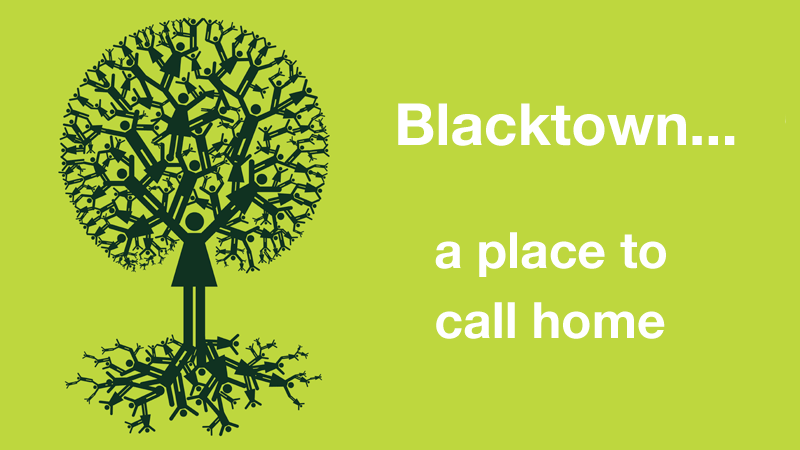BLACKTOWN COMMUNITY SERVICES CONFERENCE 2016

This year’s Blacktown Community Services Conference explored the theme ‘Blacktown: a place to call home’.
CONFERENCE OPENING
Mistress of Ceremonies, Nada Nassar, opened the conference explaining that a safe home is a basic human right and is key in creating a sense of belonging and community. In the context of Blacktown, over 335,000 people from 177 countries call the Local Government Area their home. While there are an increasing number of affluent suburbs being developed in the north east of the City, there are still many residents who have and still endure dispossession and high levels of social disadvantage. Overall, the aim of the conference was to explore the role of home in Blacktown and how local community workers and service providers could contribute practically to the creation of a home for all.
Chris Tobin (Darug artist and educator) did the official Welcome to Country and Councillor Susai Benjamin officially opened the conference on behalf of the Mayor.
PLENARY 1
The first plenary saw Chris Tobin talk about ‘Connecting to Country’ and how the push for jobs, growth, planes and cars were not his idea of increasing quality of life in Western Sydney. He saw home as a place for security but unfortunately even the notion of owning a home had become a stressful experience for many Sydneysiders. Home should not be dependent on income but a basic human right. He was concerned that when thinking of home, there was very little connection to Country and believed that Australia should be a model to the world. He called for everyone to rethink their obsession with growth and the impact this had on the wellbeing of the land and its traditional owners.
Next speaker was Heather Nesbitt from the Greater Sydney Commission. Her presentation ‘Sydney My Home Town’ outlined how Sydney is a growing social mosaic of 5 million voices with a rich Indigenous culture going back 40,000 years. With a projected population of 7 million by 2036, Sydney has also become home to an increasing number of families, households, lifestyles and cultures. Heather spoke of the Greater Sydney Commission which began in January 2016 to advance integrated metropolitan planning for Sydney. The key focus areas of the Commission were strategic planning, statutory planning, infrastructure coordination and special projects. She suggested that the major emerging social issues for Western Sydney included urban density, ageing population, obesity and lifestyle related diseases, generational and locational disadvantage, social cohesion and diversity, reasonable travel time and community capacity and resilience. This would be addressed by the Commission by focusing on quality job creation, social infrastructure, housing choice, community capacity, quality natural environment, connectivity and sense of belonging.
PLENARY 2
The second plenary saw Mary Perkins from ShelterNSW talk about establishing the homes of tenants as tenants make up one-third of Sydneysiders. She suggested that houses need to be physically accessible but also have connection to community and belonging. She also talked about that many tenants could not create a secure home for themselves for the increasing fear of eviction even though many studies have highlighted the importance of home in providing a space for people to develop their identity and feel they can be themselves. She called for serious cooperation between government, business and community to ensure secure housing for all tenants in Sydney.
PANEL DISCUSSION: A TALE OF TWO CITIES
A panel discussion saw Stuart Gibb (Community Development Manager, Urban Growth NSW) and Deborah Leo (Director, CommUnity Empowerment Inc) address the theme ‘The Tale of Two Cities’.
Stuart spoke about the rapidly developing Blacktown suburb of The Ponds, which will become home to 4,000 homes and 12,700 residents by 2017. It is a thriving suburb containing bushland, recreation, community hub and primary school. Stuart outlined The Ponds Community Development Program to facilitate community connections for new residents. This included the employment of community development facilitators, home visits, sustainability and education, cultural celebrations and events, Community Initiatives Fund and The Ponds Community Association. He suggested that The Ponds was a great place to live for four reasons: its people, urban design, facilities and culture.
Deborah spoke about her experience of emigrating from apartheid South Africa and her journey of making Blacktown home. She has lived in Kings Langley, Quakers Hill and now Glenwood and outlined how she currently works with the socially disadvantaged in Lalor Park. She suggested that the key to successful community development was making others feel like they belong.
ACTIVITY: WHAT HOME MEANS TO ME
Tony Barnden from Blacktown City Council led a group activity encouraging participants to visually depict what ‘Home Means to Me’ using a box of various craft materials.
PLENARY 3
The final plenary entitled ‘Home is where the heart is’ was presented by Atem Dau Atem from Australian National University. Atem shared his personal experience of fleeing South Sudan and coming to Australia as a refugee. He shared the joys and struggles of making his home in Australia and suggested that despite our differences, we are all Australian.
FINAL PANEL DISCUSSION
The final plenary session was an open question and answer session with Atem Dau Atem, Deborah Leo, Heather Nesbitt and Maria Maguire. They explored themes such as how to make Blacktown more inclusive and welcoming, community capacity and opportunities, community volunteerism and the impact of funding reform on service providers.
Nada Nassar thanked all the speakers and officially closed the conference.
SUMMING UP
The 2016 Blacktown Community Services Conference was a good variety of factual presentations, activities and personal stories on what makes a good home. The conference suggested that the following attributes are needed to make Blacktown a good place to call home: sense of belonging and community development, acknowledgment of traditional owners and other emerging social issues, sector cooperation and embracing difference.


